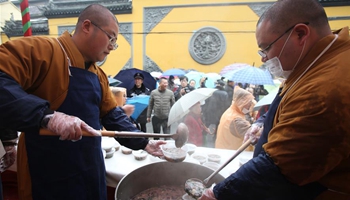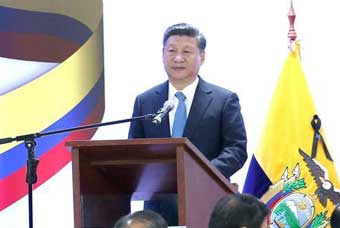BEIJING, Jan. 5 (Xinhua) -- Chinese individuals intending to purchase foreign currency now have to file more detailed information in their applications.
The increased scrutiny will not hamper normal forex purchases for overseas study or travel, but aims to counter illegal investment, authorities said.
Those who want to buy foreign currency have to specify their purpose and provide additional information, according to last week's new rules from the State Administration of Foreign Exchange (SAFE).
The SAFE stressed that each person's annual exchange limit of 50,000 U.S. dollars will remain unchanged and overseas trips and study will not be affected.
The statement reiterated that individuals should not purchase foreign currency to buy property overseas, stocks, life insurance and other specified items and said it would monitor transactions more closely and frequently, as well as punish rule-breakers.
In addition, from July, to fight money laundering, financial institutions will have to report any international transfer over 50,000 yuan to the People's Bank of China (PBOC), down from the current level of 200,000 yuan.
The new rules caught market attention amid concerns about capital outflows as the world's second largest economy slowed and the Chinese currency is under depreciation pressure.
Chinese banks continued to see net foreign exchange sales in November, and the volume expanded, while forex reserves fell for the fifth straight month to 3.05 trillion U.S. dollars, the lowest level since March 2011.
However, the SAFE dismissed huge pressure of capital outflow last month, saying the situation is still controllable.
Despite recent drops, China is still home to the world's largest forex reserve and enjoys forex inflows from its trade surplus and foreign direct investment of about 620 billion U.S. dollars each year.
It has been reported that some people lend their own annual forex quota to others who use them to buy overseas houses and other illegal items, which violate the spirit of the regulations and might contribute to fraud, money laundering and underground banks.
Individuals can purchase in excess of 50,000-USD as long as they provide an authentic reason, according to the SAFE.
A disorderly flow of large amounts of capital might trigger financial volatility and weigh on economic growth, as shown in previous financial crises.
The government's latest moves might help counter the drop in forex reserves, but that does not mean that China is backtracking on opening up the capital market, said Zhou Yu, a researcher with Shanghai Academy of Social Sciences.
Individuals should not blindly follow the trend of purchasing U.S. dollars as the forex market is constantly changing, Zhou added.
The dollar stepped further from a 14-year peak against a basket of currencies on Thursday, as investors locked in gains from a two-month rally since Donald Trump won the U.S. presidential election.
The central parity rate of the Chinese yuan strengthened against the U.S. dollar on Thursday, after the biggest daily gain in about a year in offshore yuan on Wednesday.














